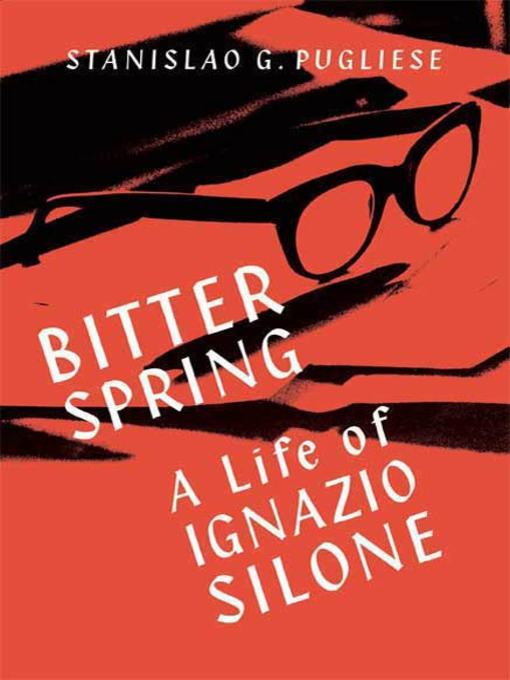
Bitter Spring
A Life of Ignazio Silone
- اطلاعات
- نقد و بررسی
- دیدگاه کاربران
نقد و بررسی

April 6, 2009
There was a time when Ignazio Silone was the most famous Italian author in the world. His earliest novels, such as Fontamara
and Bread & Wine
, were praised for their depictions of peasant life in his native Abruzzo. As Pugliese reveals in this solid and engaging biography, Silone’s literary reputation in his own country was complicated by his political legacy; having joined the Italian Communists to advocate social justice and fight fascism, the author was dismayed by the party’s authoritarian tendencies and was eventually expelled. Pugliese (whose previous book was on Carlo Rosselli, Silone’s contemporary in the Italian socialist movement) builds his biographical case in careful blocs of information, describing the drama while maintaining the narrative. This holds true even during a review of the controversial discovery, 20 years after Silone’s death, of documents that suggest he might have given information to the Fascist police while still a Party member. In graceful prose, Pugliese offers a few intriguing theories (was Silone shielding someone? was he hiding a homosexual affair?), but reluctantly concedes that we may never know the full truth. Whatever did happen, Pugliese concludes, led Silone to create “some of the most poignant and powerful fiction of the 20th century.”

May 1, 2009
The first full English-language biography of the celebrated Italian novelist (born Secondino Tranquilli), a forceful spokesman for the peasantry whose posthumous reputation has suffered from charges of fascist collaboration.
Pugliese (Modern European History/Hofstra Univ.) addresses a more general readership here than in the thoroughly academic Carlo Roselli: Socialist Heretic and Antifascist Exile (1999), and the results are generally illuminating. After some hand-wringing about the nature and difficulties of the biographer's art, the author presents a fairly traditional text about Silone (1900–78), examining the writer's home in deeply rural Italy, family, education, crises, loves, travels, publications—Faulkner, Bertrand Russell and other luminaries admired such novels as Bread and Wine (1937)—honors, controversies, death and its aftermath. Some principal members of his family died in a horrible earthquake in 1915, and for most of the rest of his life he relied on his own resources and character. He did not have much formal education but was a ferocious reader with an adhesive intelligence. An advocate for the cafoni (a harsh word for peasants that he often employed), Silone initially allied himself with the Italian Communist Party, but eventually abandoned organizations of all kinds, including the Catholic church. He was frequently hounded by police forces and imprisoned. Because of his writing skills, he was soon enlisted to write for and edit various left-wing publications; he founded Tempo Presente, one of his life's true loves, in 1956. He had to live away from Italy at times, especially during the reign of the fascists, whom he attacked in his fiction and journalism. His first half-dozen novels were first published in Zurich, where he lived in the 1930s and early'40s. He had two serious involvements with women, one of whom Pugliese interviewed before her death, but does not appear to have had much interest in sex. The biographer, who devotes many pages to the disturbing charge that Silone acted as an informant for the fascist police in the'20s, cannot provide a definitive answer, but advances mitigating theories.
Rigorously argued, often passionate and wise.
(COPYRIGHT (2009) KIRKUS REVIEWS/NIELSEN BUSINESS MEDIA, INC. ALL RIGHTS RESERVED.)

Starred review from May 1, 2009
Often compared to luminaries such as George Orwell and Graham Greene, Ignazio Silone has somehow eluded the attention of English-speaking biographers. Until now. With this assiduously researched work, Pugliese finally gives readers a mature account of a life that produced some of the twentieth centurys most powerful and widely translated literary art and political commentary. A compellingly detailed narrative reveals how a difficult childhood in rural Italy inspired religious faith that never fit within ecclesiastical orthodoxy and kindled political passion that defied ideological conformity. Readers see how the young writer risked imprisonment and death to help found Italys Communist Party but then repeatedly defied party leaders, denouncing Stalinist atrocities so fearlessly that his comrades expelled him from their movement. Yet Pugliese recognizes that this expulsion emancipated the novelists creative energies, liberating him to write fiction that would forever enrich European literature as it exposed the dehumanizing brutality of fascism in Fontamara and illuminated the risks of partisan commitment in Bread and Wine. In the autobiographical elements of Silones novels, some critics have adduced evidence that the young writer treacherously collaborated with Fascist authorities. Pugliese insists on a more ambiguous reading of the literary artand of the life that produced it. A much-needed work of literary and political scholarship.(Reprinted with permission of Booklist, copyright 2009, American Library Association.)




دیدگاه کاربران